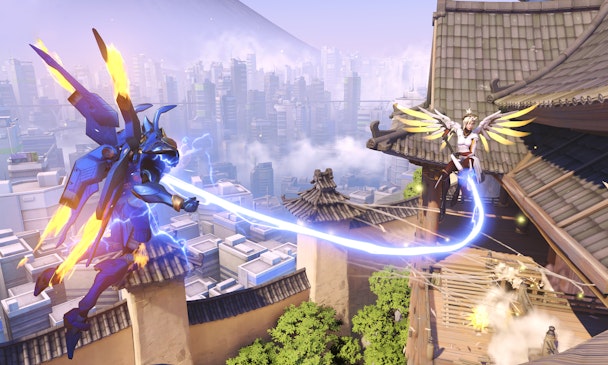Microsoft buys Activision: how the biggest deal in gaming history will impact adland
Microsoft has acquired video games giant Activision in a deal worth $68.7bn, the largest deal in gaming history. The price indicates the value the industry puts on tentpole franchises such as World of Warcraft, Candy Crush and Overwatch – and in particular the advertising opportunity in these IPs. The Drum investigates.

The deal has major implications for how marketers need to approach gaming audiences
Speculation remains about whether the deal will trigger an investigation into monopolistic practices. Meanwhile, there’s still heat around Activision president Bobby Kotick following a wave of investigations into internal malpractice and discrimination.
Beyond that, the move gives Microsoft access to a greater suite of mobile titles at a time when the mobile gaming industry is the fastest-growing part of the most lucrative entertainment medium in the world. It is the latest in a wave of consolidation in the gaming space; only last week Take-Two acquired Zynga for $11bn.
While monopolies are undoubtedly bad news for the video game industry, this acquisition could have some positive effects on Blizzard both culturally and strategically. Under Activision, every game had to be a billion-dollar franchise. Under Xbox, that will likely change
— Jason Schreier (@jasonschreier) January 18, 2022
The acquisition would have been unthinkable a few years ago, with Activision riding the highs of its most lucrative IPs. After controversies surrounding World of Warcraft (including a mass desertion of users) and the heat upon Kotick for allegedly hiding the extent of sexual misconduct allegations within the company, however, Activision is in a weakened position – and the price actually reflects that.
Of the acquisition, founder of specialist gaming agency YrsTruly MJ Widomska says: “As part of the acquisition, Microsoft bought King, the developer and publisher of Candy Crush and one of the largest F2P mobile gaming companies in the world. It’s not an area that Microsoft has shown much interest in in the past, so it’s too early to predict what they may do with King. But it’s important to keep in mind that Microsoft itself is already redefining the gaming market with Xbox Game Pass, its affordable subscription model.
“In a nutshell, it can be described as Netflix for gaming – and in a market where new games often cost over £50, it’s proven quite popular. Xbox Game Pass, as a centralized marketplace for games, could certainly prove to offer opportunities to marketers in the future. For now, we just need to wait and see – and it’ll be quite the wait, as the deal is expected to close in 2023.”
The key point for marketers is that Microsoft’s spending spree is in service of reaching billions – not millions – of gamers. Its control of a huge amount of IPs and their extensions into mobile potentially gives brands and advertisers a centralized way to reach that growing and lucrative audience.
To put that potential into perspective, this acquisition is on parity with Disney's acquisition of 21st Century Fox in 2019, and is based on the size of the audience.
Matthew Warneford, founder of Dubit, explains: "The under 30's watch 60% less TV than they did a decade ago. Our Dubit Trends data shows kids now spend more time in games than watching online video. To that end it's not surprising that gaming companies are becoming hugely valuable assets to own."
It leaves Microsoft’s most direct gaming hardware competitor Sony in a difficult position, with the potential to make some of the most popular series exclusive to Microsoft platforms such as the Xbox Series X and PC. Sony’s share price slid double digits on Wednesday on the news.
Mobile and the metaverse
Jeff Sue is general manager of Americas at Mintegral, a mobile marketing platform. He explains: “Mobile free to play has been growing quickly during the past few years and will continue to. User acquisition plays a very important role in free-to-play gaming and will in the metaverse. Acquiring free-to-play games in different genres with different demographics is a way to cross-promote audiences. I also believe that Microsoft will acquire a mobile-focused ad platform, possibly one they already have a partnership with, to control their own destiny in the mobile ads space (similar to what Zynga did with Chartboost).
“This adds to Microsoft’s recent acquisition of Xandr, a CTV play. Also, when brand advertising becomes more familiar with gaming inventory, owning large and varied gaming supply, with data, will be key for reach and larger budgets.”
In The Drum’s metaverse deep dive we caution against believing the hype at the moment. However, the fact remains that Satya Nadella, chairman and chief exec of Microsoft, has stated that “gaming ... will play a key role in the development of metaverse platforms.”
NOT EVERYTHING IS ABOUT THE METAVERSE https://t.co/LbwL52dvcK
— Keza MacDonald (@kezamacdonald) January 18, 2022
Despite that future-gazing, author and metaverse expert Tom Ffiske says this is more of a marketing play than a true investment in the metaverse: “Yes, gaming is a way for people to come together and socialize; but Microsoft has not explored how it can be folded together as part of an expansive and interoperable virtual world. If we see Master Chief leaping from Fortnite to VRChat to Rec Room, then we are well and truly in the metaverse; but right now we will see Master Chief drinking mojitos next to Crash Bandicoot within the high green walls of the Microsoft ecosystem.”
The reality is that we’ll need to wait to see how this impacts the gaming landscape in terms of series, exclusives and releases. But in the immediate future, we can guarantee that a flood of advertising money will follow the acquisition, seeking to take advantage of both the extension of valuable IPs into mobile and Microsoft’s access to a suite of gamers.

